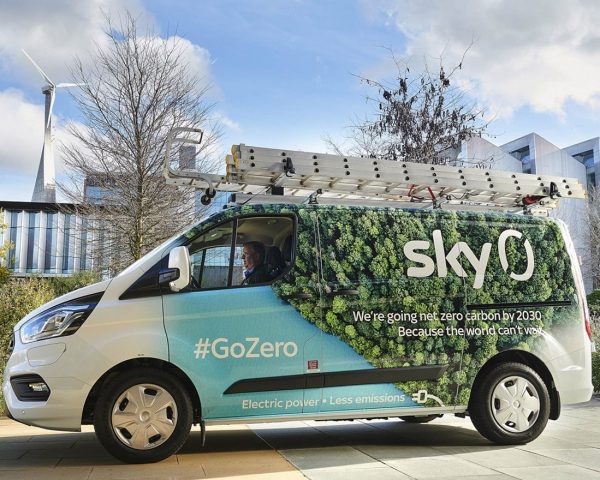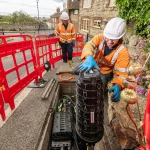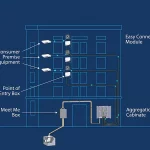Sky UK Engineers Adopt Ford Plug-In Hybrid Electric Vans

Sky UK (Sky Broadband, Sky TV) has today become the latest media and broadband operator to start transitioning their fleet of engineer vehicles to more energy efficient ones, which in this case means the adoption of 151 Ford Plug-In Hybrid Electric Vans (PHEVs) rather than full EVs.
The new Ford PHEV Transit vans are said to have a zero-emission range of 35 miles, whilst operating with a full load and carrying the ladders required for most installations. The new additions deliver a CO2 reduction of 90 g/km, which is a CO2 saving of 60%, and will be assigned to low-mileage Sky Engineers to “maximise the electric battery capacity and target a zero emissions operation.”
The new vans also feature geofencing technology, which automatically modifies the vehicles settings based on its location, enabling it to switch into electric-only mode with urban and low emission areas. All of this should help Sky on their path toward becoming a net zero carbon company by 2030.
Advertisement
Jeremy Darroch, Group CEO of Sky, said:
“This is an exciting move towards our Sky Zero commitment to be net zero carbon by 2030. The arrival of these Ford Transit Plug-In Hybrid Vans means we are cutting emissions today, while working towards finding 100% electric solutions for tomorrow.
The great strength of our business is its ability to adapt to change, and responding to the growing climate emergency is no exception. We want to work with suppliers and the government to speed up the transition to net zero fleets and ensure we have a strong charging infrastructure across the country.”
Just for comparison, BT (EE) hopes to achieve net zero carbon by 2045, while Virgin Media has aligned itself with the RE100 initiative’s general 2050 target and O2 hope to be one of the first to reach this point by 2025 (we’re not sure if this will change after their merger with Virgin).
Mark is a professional technology writer, IT consultant and computer engineer from Dorset (England), he also founded ISPreview in 1999 and enjoys analysing the latest telecoms and broadband developments. Find me on X (Twitter), Mastodon, Facebook, BlueSky, Threads.net and Linkedin.
« Study Finds Full Fibre is the Most Energy Efficient Broadband
BT Sport TV App to Finally Get Dolby Atmos Sound on Saturday »






















































Very odd.
Why buy a PHEV and then give it to low milage engineers?
So you are carting an engine around that is rarely used?
Surely for low milages a BEV makes more sense and simplifies the vehicle?
We looked at BEV vans last year and were not very impressed other than the Nissan but that has limited payload would be fine for small light stuff in City.
The Ford is running on 48V tech not the 400V (Tesla) or 800V (Porsche) so it is a tech light effort. The reason for using high voltages is that it is lower current and reduces battery, motor and cable heating and ageing.
Yes, but using 400V means more batteries and a far higher cost per vehicle. Though, the cynic in me believes this is just another corporate “green tick-box exercise” to allow Sky execs nothing more than to give themselves a pat on the back.
48V means you don’t have high charge rates and loose a lot to resistive heating.
So you cannot supercharge.
Smaller 400V cell packs exist as well.
Why more batteries BL? Pile voltage isn’t a function of the number of cells.
If the engineers take the vans home, which I think they all do, how many will bother plugging in. Previously lease companies have found that most charging cables on company PHEV’s don’t even get unwrapped.
That is indeed a real problem.
Mostly made worse by there not being good on street charging and the poor old engineer not wanting to leave his work van of tools out of sight.
Working in an industry where van breakins are routine I do have a lot of sympathy.
I am a 100% Battery EV driver. The worst thing about owning one HAS to be PHEV’s and ICE (petrol or diesel) cars blocking the chargers by the most selfish people in Britain. You wait and they know EXACTLY what they’ve done (on purpose) and they often smirk or swear at you to add insult to injury. If only 3 points and £1000 fines were reality… That would pay for all the new chargers for sure.
Why would a PHEV Van driver want to charge a company vehicle from a private house socket? This will incur the employee money which only the company benefits from.
Vans would need something like 200 Kilowatt batteries in order to ditch internal combustion. It’s coming but it won’t be ready for several years.
Fully agree with all the comments on here, “box ticking PR exercise” especially.
A very dumb, nonsensical, ill-informed move.
PHEV’s have been found to be MORE POLLUTING than petrol and diesel vehicles. See the reports below;
https://www.thisismoney.co.uk/money/cars/article-8977211/Are-plug-cars-really-green-claim-Report-suggests-not.html
https://www.transportenvironment.org/publications/plug-hybrids-europe-heading-new-dieselgate
https://www.transportenvironment.org/press/plug-hybrids-new-emissions-scandal-tests-show-higher-pollution-claimed
It’s not about saving the environment, it’s about virtue signalling.
Absolutely Jim
Companies are installing rapid chargers which cost anything from 36p/Kilowatt to 75p/Kilowatt usually plus £1 start fee. Tesla consumes around 400 Watts per mile that’s 2.5 miles per kW (unit), even at the lower rate of 36p it’s still about 15-20p/mile after the connection fee.
Electric from these places is already turning out to more expensive than the highest Diesel and Petrol forecourts so this goes against ‘going green’.
Nothing like hindering a new technology with overpricing it eh!
Maybe it’s BT priced Electricity!
It’s not good for battery to user supercharger anyway. It’s only for emergencies/longer trips
You are supposed to charge it slower overnight. And electricity at home is much cheaper.
We very rarely use supercharging on any of our company cars.
Most of our Tesla’s have free lifetime supercharging.
You don’t really need it for most journeys. You charge it overnight. Drive to Birmingham, do what you need to do for a few hours while it is on a 22kW charger (increasingly common) you drive home to London with a full battery. No supercharging needed.
The ONLY time I need supercharging is London to York type distances. All ours are long range batteries.
Back to the thread for local use a 75kW battery would be fine for a loaded van used for 150m/day.
It’s the only alternative to diesel at the moment for a decent sized van
But diesel/petrol IS actually cleaner.